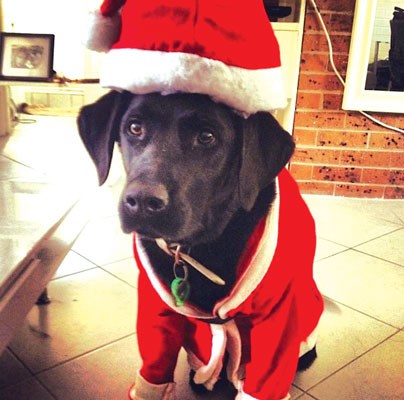Let's admit it: Christmas goes against the grain. At this dark time of year, when our bodies are telling us to withdraw, so we can rest and recuperate from the stresses of the year, our mad, consumer-driven "first" world demands that we race around faster than any hamster in a wheel. The result? Increased stress levels for everyone in the household.
These increased stress levels affect our companion animals too. In fact, the winter holiday season is probably the most stressful time of the year for them. Household rules are relaxed and routine patterns, which most animals really appreciate, are disrupted. There might be extra people in the house, some of them perhaps not comfortable with animals or respectful around them. Some of the rich foods that we humans adore in the holiday season can pose greater health risks to our animals than our regular fare. And the noise of celebrations can be traumatic for our pet cats and dogs and especially for prey animals such as rabbits, guinea pigs, hamsters and mice.
We will do well to minimize such causes of stress if we can. Keep your companion animals away from the most boisterous celebrations and maintain their feeding and exercise routines as closely as possible. And if Fido gets extra walks over the holidays, he will likely not complain!
One big no-no is the practice of giving kittens or puppies as Christmas presents. Animals do not make good gifts, especially not surprise gifts. The decision to take an animal into the family needs to be taken carefully, with full awareness of the likely commitment of time, money and affection.
Here's a realistic suggestion about the financial implications of having a companion animal: A rough calculation of the annual cost of feeding a cat is $60 per month, i.e. $720 per year. Add in other costs such as visits to the vet for shots, kitty litter and toys, and you are certainly talking about more than $1,000 per year. Dogs are likely to cost considerably more, since you can't leave a dog alone as you can a cat, so there will be dog-care costs for most households. A figure of $2,000 per year is not unreasonable.
What's more, the puppy you give might be an animal bred at an unscrupulous puppy mill. If so, it will likely have a whole host of health and psychological issues already – more stress and more expense.
Unfortunately, the number of kittens and puppies abandoned or surrendered to animal shelters escalates dramatically in the weeks after Christmas, as people tire of the cute little fluffy thing when it starts chewing shoes or pissing indoors or develops a respiratory infection. If you must give a kitten or a puppy, please discuss it with the recipient first.
Strangely, the number of older pets surrendered to rescue agencies goes up in the weeks before Christmas. I don't understand this, but wonder if people's travel plans are relevant. (Animals are abandoned all through the summer months too, which must correlate to people taking holidays.)
If you are interested in giving the best possible Christmas present to an abandoned animal, please consider welcoming into your home one of the animals waiting for new foster or forever homes locally, maybe choosing an arrival date early in the New Year, after the festivities are over. For example, check out the dogs listed by Dogwood Rescue, a local organization who re-home dogs, young and old, from all over BC and who rescue dogs from high-kill shelters in the US.
I speak from experience when I say that the gratitude of abandoned animals is very real: they do seem to understand that they are being given a second chance.
Finally, a plea: if you find yourself unable to care for your animal, please don't just abandon it, but work with the local animal welfare organizations who will do all they can to find a good solution for the animal.
May your winter holidays be healthy and happy for all members of your family, human and animal.



